
*
When one (stage) door closes, another opens. At least that's the case for actor Jeremy Jordan, who, after originating the role of gun-slinging heartthrob Clyde Barrow in Frank Wildhorn's short-lived Bonnie & Clyde last fall on Broadway, opens in a second musical on Broadway this season — Disney's Newsies. Following a critically acclaimed monthlong run at New Jersey's Paper Mill Playhouse last year, the stage adaptation of the 1992 movie musical, is now at Broadway's Nederlander Theatre, playing a limited 101-performance engagement.
In the musical, which features a new book by Tony winner Harvey Fierstein and additional music from "Newsies" songwriting duo Alan Menken and Jack Feldman, Jordan stars as the heroic Jack Kelly, originated in the 1992 movie-musical by Christian Bale. While in the final days of rehearsals, we spoke to Jordan about his start in musical theatre, working with Newsies and Bonnie & Clyde director Jeff Calhoun and revisiting his "dream role" for Broadway. Read more about it.
Let's go back to the beginning. Where were you born and raised, and at what age did you start performing?
Jeremy Jordan: I was born and raised in Corpus Christi, TX. I did some community theatre — my grandma directed children's shows when I was, like, five-to-ten-years-old. Around middle school I joined a choir, and I discovered my love for singing. Around high school I slowly started getting into acting, and the rest is history.
Did you want to be a singer, primarily, or was theatre the goal?
JJ: I didn't really want to do either of those things until my junior or senior year [of high school]. I always wanted to be a scientist or a technology-guru and invent things. To make a long story short, before my junior year of high school, I went to this big invite-only technology conference for future technology leaders, and I hated every second of it. I didn't connect with the people. The material wasn't interesting to me, and I said, "I have to re-evaluate." I decided to take the more tentative path and try theatre, which seemed crazy. [Laughs.] But I like it.
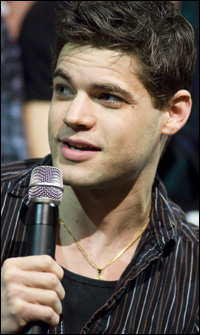 |
||
| Jeremy Jordan at the Newsies press day |
||
| photo by Monica Simoes |
JJ: [Laughs.] I almost didn't take it. I went in for the character [of Matt], and they ended up casting it older, so they said, "Come play the Mute!"… It somehow unleashed this excitement for acting. I never really acted [before]. I just sang and kind of faked it.
I had just come back from that [technology] conference, and I knew that's not what I wanted to do, so I thought maybe I would be a singer, but I was like, "What am I going to do?" I didn't really want to be a recording artist, and I didn't really want to be an opera singer. [When The Fantasticks] came along, the guy playing El Gallo told me, "You might have a future in this if you really want to do it." I thought about it and explored it. He became my mentor — got my [audition] book started, gave me some monologues and songs, coached me and helped me apply for schools. I went to Ithaca College.
Did you study musical theatre?
JJ: I did. I didn't really know any theatre performers until I got to college and started studying it. I idolized Hunter Foster and Gavin Creel — those kind of guys. They were the young, up-and-coming performers when I was in college… I always wished I could have the career of Leonardo DiCaprio or Matt Damon.
Did you want to go the film route? You recently starred in "Joyful Noise."
JJ: I always wanted to explore everything, so the fact that ["Joyful Noise"] came along was a great surprise. It's definitely something I want to do more of. I want to be able to do movies and theatre.
Your first Broadway show was Rock of Ages?
JJ: Rock of Ages — I was a swing. I went to an Equity open call. I wasn't really right for any of the roles, but I tried to go in for everything. I went to the open call and got a callback. They needed someone who could play Drew, a rocker, and also play Franz, the gay German boy. [Laughs.] Not many people could fit both parts and sing both parts. I happened to be right in the middle. [After Rock of Ages], I went straight into West Side Story. I was Tony twice a week. I did Wednesday nights and Sunday matinees. I just had my two shows, and that was it. To be honest, that wasn't the initial offer. I had auditioned for the replacement, and they called and wanted me to be the standby. I thought, "Well, I'm already a swing right now," so it felt like a lateral move. I wanted my next job to be a step up. I turned it down, and then they said they'd sweeten the deal!
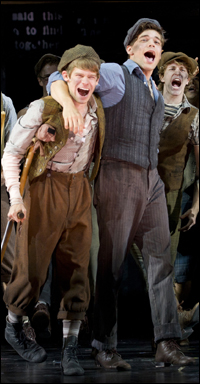 |
||
| Jordan and Andrew Keenan-Bolger in Newsies. |
||
| Photo by T. Charles Erickson |
JJ: The first reading was about a year-and-a-half ago. It's funny because, somehow, I wasn't in the initial audition call for Jack. They were only auditioning for Jack and Davey, and they were going to fill out the other roles with guys who had already worked for Disney — just to get it read. I guess they couldn't find the right Jack, so they called up my agent. I came in and got the part. How did the reading evolve into the fully staged Paper Mill Playhouse production?
JJ: After the reading, [director] Jeff Calhoun came onboard. They actually had a second workshop, which I wasn't able to do because I was doing Bonnie & Clyde, [also directed by Jeff Calhoun], in Florida [at the Asolo Repertory Theatre]. During that time, it was announced that Jeff was going to be the director, but Bonnie & Clyde was coming to New York around the same time. The dates were able to work out if I did a couple weeks of double-duty. I mentioned it to Jeff briefly, saying, "I'd really like to get a chance to audition for Newsies." He said, "Well, I don't think that you're going to be able to do it with Bonnie & Clyde." That was it. Then, a couple weeks later, I got a call from Jeff, and he told me, "Tomorrow you'll be getting a call with an offer to do Newsies." I was like, "I don't even have to audition? That's pretty incredible!" He had enough faith in me after working with me on Bonnie & Clyde. He could tell that I was passionate about it.
Can you explain working double-duty? What did your schedule look like?
JJ: It was a lot! I would come into the city [from my home in New Jersey] and rehearse from 10 AM to 4:30 PM. Then, I would leave, go back to Jersey, get in my car and drive to Paper Mill for a 7:30 PM show. I'd get back home at around 11 PM and do it all over again the next day. They were like 13-to-14-hour days.
Beyond being physically exhausted, were you emotionally exhausted as well?
JJ: It wasn't so emotionally draining as it was physically and mentally. I thought that I was going to get sick and maybe even lose my voice. I did lose my mind! [Laughs.] But, for the most part, I kept it together. I didn't really get to talk much to anybody, including my fiancée, [Ashley Spencer], or my family. I just slept and worked.
| |
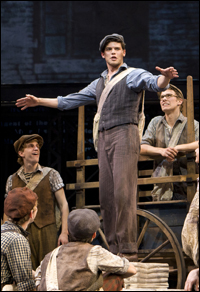 |
|
| Jeremy Jordan | ||
| photo by T. Charles Erickson |
JJ: I agree. I approached my character from a personal standpoint. I grew up on the movie, and I remember the movie, but I haven't watched it a lot as an adult, which I am grateful for because I don't have Christian Bale in my brain. I love that [Jack's] an artist… He is the leader of the newsies in the movie, but he's sort of thrust into that position. Here, he's naturally charismatic. Everybody loves him, and they deservedly look up to him — not just because they fear him, but because he's a likable guy. He's really this romantic guy, who just wants to be somewhere else, but he puts up a façade in order to protect himself.
Right. He puts up the "tough-guy" act from the beginning. At what moment in the show does he change? Where do we see his softer side?
JJ: With Katherine, the new character: She starts to see that there's something there that's not quite on the surface. Slowly, she starts to uncover it. He's very resistant at first, but then she just breaks down this barrier, and he allows himself to open up to somebody for the first time. She comes along and makes him feel something more than longing or regret or sadness that he has to cover up. He can really be genuine. In the stage version, Jack's relationships with the boys are strengthened, making the stakes higher. He wants to succeed, not only for Katherine, but for his friends as well.
JJ: Well, of course. I think when the strike comes along, Jack finally finds a purpose. One of the reasons he longs to be somewhere else is because he's got no reason to be here. If he could go to Santa Fe, he could make something of himself and have a life that could be worth living instead of just making ends meet. With the strike and with his love for Katherine and this "family" that he is thrust into protecting, he realizes that everything that is here is worth staying for, living for and fighting for.
I like how the first act begins and ends with Jack singing "Santa Fe" — it creates a beautiful arc.
JJ: Me, too. That prologue is one of my favorite additions to the show because you expect Newsies to start off with all the boys and the hustle-and-bustle, but you really see — from the get-go — the heart of the piece… You kind of get lost in the excitement and the rallying and the striking, and then you're reminded at the end [of the first act] of the plight of these boys and how devastating their situation has been.
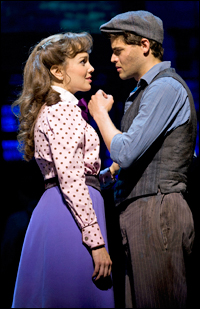 |
||
| Kara Lindsay and Jeremy Jordan |
||
| Photo by T. Charles Erickson |
JJ: Well, the only disadvantage is that we don't have Bill Pullman [who played Bryan Denton], but I don't think we were going to get him in the first place! [Laughs.] Instantly, the story is more interesting. You need a female character in a show. There's a great new aspect of women's suffrage and women's rights and women coming up in the world that's added by this one character. It adds a whole new level to the progressive nature of the piece, and it also adds a pretty nifty love story and some cool twists along the way. Alan Menken mentioned that Jack's duet with Katherine in the second act has changed for Broadway.
JJ: Yeah, it's different. In the Paper Mill version, it was much more of a "let's-figure-out-what's-really-going-on-here" kind of a song. It was like a scene that was set to music. Here, we really made it into a love song, which is something that we needed in that moment. It's a Disney show, and it's a love story. I think it's only appropriate to have a kick-ass love song, and that's what we've put on stage.
Tell me about the dancing in the show. Were you always a dancer?
JJ: [Laughs.] No. I'm not a dancer, Michael! I think people think I dance more than I do just because there's so many guys dancing, and you can't always quite tell who is who. I do get to dance. I dance more than I've ever danced before on Broadway, so I'm working pretty hard, but everybody else makes me look good — I can't complain! It's fun and exciting to get to do a little bit here and there without being pressured to have to do double tours and split-leaps. [Laughs.]
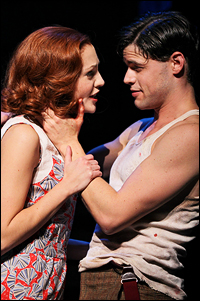 |
||
| Laura Osnes and Jeremy Jordan in Bonnie & Clyde. |
||
| photo by Nathan Johnson |
JJ: Jeff is the only guy I work with nowadays. I don't know if you heard! [Laughs.] It's literally my fourth production in a row that I've worked with Jeff on. It's a dream. Jeff is a wonderful director. He's got a great eye. He casts wonderfully. He speaks eloquently, and gets out of your way and knows exactly when to step in. He's unselfish. He's a true collaborator.
Originating two roles in one season — is there pressure?
JJ: Pressure? No, I'm excited! It's kind of strange that I'm originating two roles in one season. The reason that doesn't happen often is because, generally, when you originate a role, hopefully [the production] stays open for a while so you can't originate another role in the same season. [Laughs.] Sadly, one show had to close in order for that to happen, but it's exciting. I never really felt like I've made my mark on the New York stage, and now, suddenly, I feel like I'm bursting onto it. I feel like my career is on an upswing. It's thrilling!
Besides Newsies, do you have any upcoming projects?
JJ: Just Newsies. I'm hoping that we'll be sticking around at the Nederlander for a while. (Michael Gioia's work frequently appears in the news, feature and video sections of Playbill.com. Write to him at [email protected].)
Watch highlights from the Paper Mill production of Newsies:









